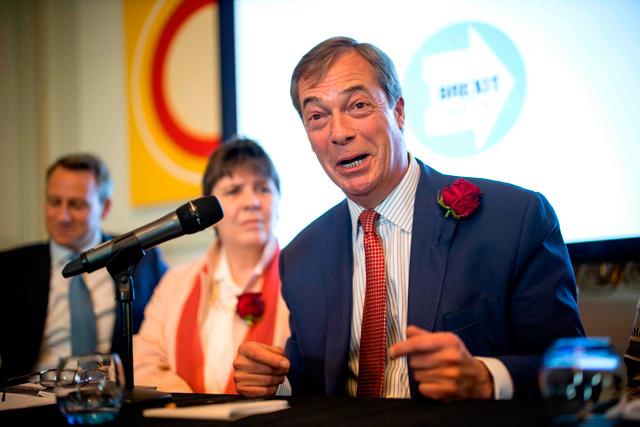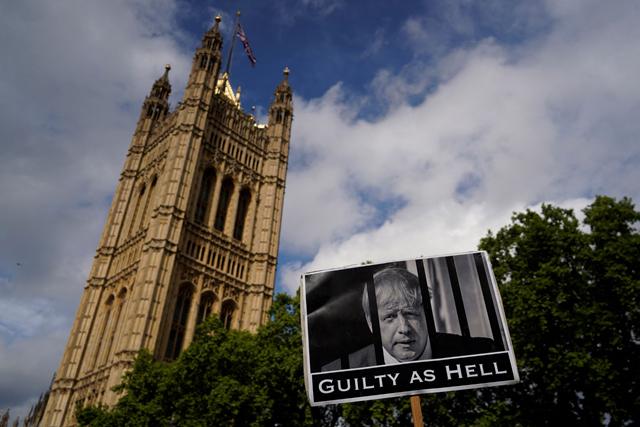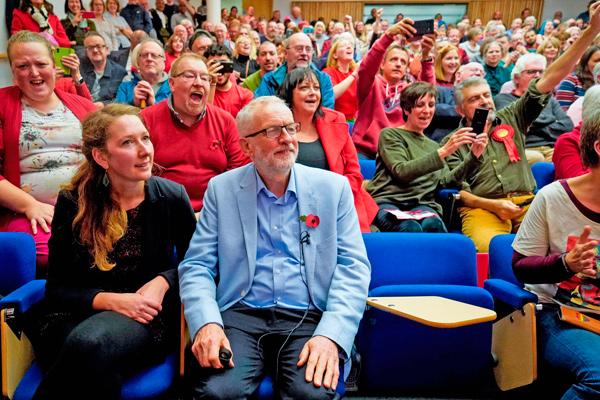You are here
Pro-EU party launches election campaign as MPs return from break
By AFP - Apr 23,2019 - Last updated at Apr 23,2019

Brexit Party leader Nigel Farage speaks during a candidate launch event for the European elections in central London on Tuesday (AFP photo)
LONDON — A new anti-Brexit political party launched its campaign Tuesday for next month’s European elections as British lawmakers return from their Easter break as fresh bids to topple Prime Minister Theresa May mount.
The government and the main opposition Labour Party are also set to resume talks later Tuesday in an attempt to find agreement over Brexit after weeks of negotiations showed little signs of progress.
Britain is mired in a deep political crisis over its departure from the European Union, three years after a divisive referendum that voted to pull Britain out of the bloc after nearly half a century.
May was forced to ask EU leaders earlier this month to postpone Brexit for a second time — from April 12 to October 31 — after MPs repeatedly rejected the divorce deal she has struck with Brussels.
She is still hoping to persuade Labour to support the plan so the country can leave in time to avoid taking part in the European Parliament elections on May 23.
But with one month to go, few are expecting a consensus to emerge and Britain’s political parties old and new are scrambling to organise for the upcoming polls.
‘Impelled to stand’
Change UK, formed by breakaway MPs from Britain’s two main parties disgruntled at their stances on Brexit, unveiled a roster of candidates at an event in Bristol in southwest England.
The list includes former Polish deputy prime minister Jan Vincent Rostowski and prominent columnist Rachel Johnson — the sister of former foreign minister and leading Brexiteer Boris Johnson.
Rachel Johnson told London’s Evening Standard newspaper she felt “impelled to stand up and be counted for what I believe in”.
Veteran journalist Gavin Esler, who spent decades reporting for the BBC, is also among those standing, saying he was “seriously worried about the future of our country”.
Interim party leader Heidi Allen, who quit the Conservatives in February, said it had received 3,700 candidate applications, many from former Labour, Tory, Liberal Democrat and Green activists.
“This is the home of the Remain alliance,” she said, adding the elections are a chance to reiterate the need for a second referendum on Brexit.
Anti-EU firebrand Nigel Farage launched his new Brexit Party’s campaign earlier this month, with Annunziata Rees-Mogg — the sister of leading Tory eurosceptic Jacob Rees-Mogg — one of its candidates.
The former UK Independence Party (UKIP) leader, who led that party to first place the last time Britain held European elections in 2014, has seen his new grouping surge in the polls since the launch.
It also announced on Tuesday five more candidates, which include Claire Fox, a left-wing libertarian and regular TV pundit.
Vowing to target traditional, Brexit-leaning Labour constituencies in the Midlands, south Wales, and northern England, Farage said he believed the party could win the contest.
‘Fresh leadership’
May’s Conservative Party is watching nervously, with predictions its share of the vote could plummet amid voter discontent over her handling of Brexit.
MPs are agitating for the prime minister, who has agreed to resign once the first phase of the exit process is finished, to make way for a new leader now.
Nigel Evans, a senior member of the powerful 1922 Committee of Tory MPs, told the BBC on Tuesday he would be “delighted” if she announced her resignation immediately.
“I believe the only way we’re going to break this impasse properly is if we have fresh leadership,” he said.
On Monday, it emerged May could face an unprecedented vote of confidence in her leadership after dozens of local Conservative association chiefs signed a petition in support of a poll.
They called for an extraordinary general meeting of the party’s rank and file so they could hold the non-binding vote, according to reports.
May survived a vote of confidence by her own MPs in December and under party rules cannot be challenged again for a year.
But grassroots discontent could increase pressure on the 1922 Committee to find a way of forcibly removing her from office.
Related Articles
LONDON — British Prime Minister Boris Johnson on Monday survived a vote of no confidence from his own Conservative MPs but with his position
LONDON — Anti-EU populist Nigel Farage’s star turn on a popular reality TV show is fuelling speculation the divisive figure may be plotting
LONDON — British Prime Minister Boris Johnson on Sunday apologised for not taking Britain out of the European Union by October 31, while Bre


















